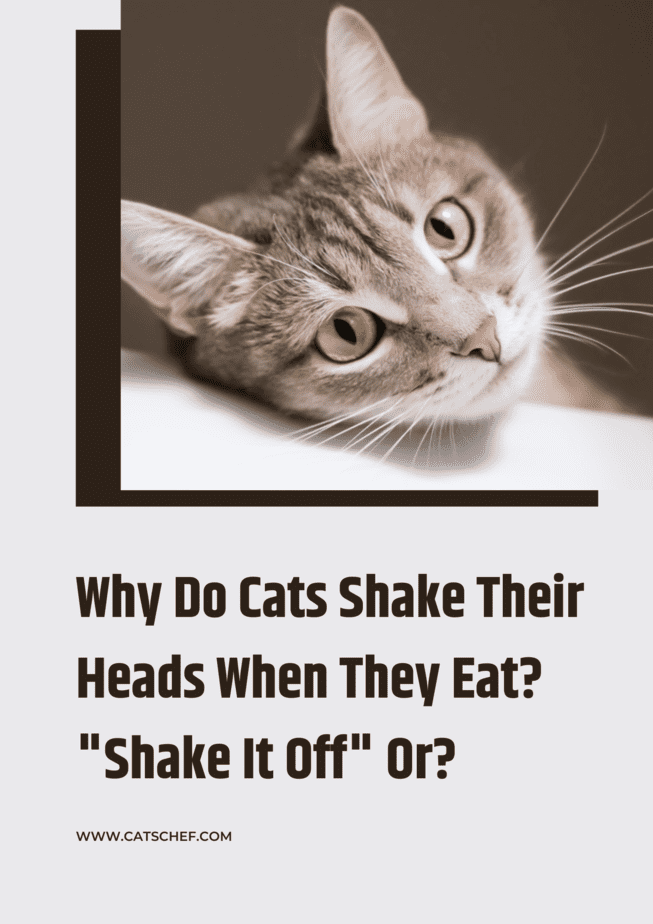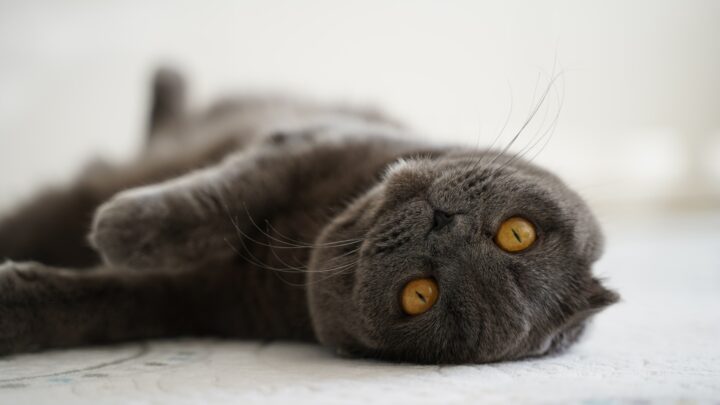“Why do cats shake their heads when they eat?”, you think to yourself as you’re watching your curious creature munch on her minuscule morsels. You’re pretty sure you shouldn’t be worried. You’ve seen your share of super suspicious behavior that hasn’t gotten her sent to the vet’s office… Yet.
“Cats are weird.”, you mumble under your breath. You can’t help but remember that Riverdale thing that became a meme (for a good reason) whenever you look at your mischievous monster.
“In case you haven’t noticed, I’m weird. I’m a weirdo. I don’t fit in. And I don’t want to fit in. Have you ever seen me without this stupid hat on? That’s weird.” You never thought you’d compare your favorite fluff to Jughead.
But, how can you not when everything she does makes you want to scream? “Why? Why are you like that?!”
Cats are ding-a-lings for most of their lives and you know that! Rubbing, headbutting, kneading, chattering, knocking things over, and fitting into the smallest of spaces (how do they end up sleeping in your favorite vase?!) are only some of the things they do that you can think of from the top of your head.
And, truth be told, that’s why we love them so much. Most pet parents can’t help but spend hours a day observing their feline friends. Most of the time, we are wondering what they’re doing and why they’re doing that. Then we hop online for advice whenever we notice something out of the ordinary.
“Why do cats shake their heads when they eat?”, seems like a perfectly reasonable thing to wonder. Despite sharing your living space with your favorite feline friend, the two of you don’t really have much going on. Other than unavailing the mystery of her behavior, of course.
Why are cats the way they are?
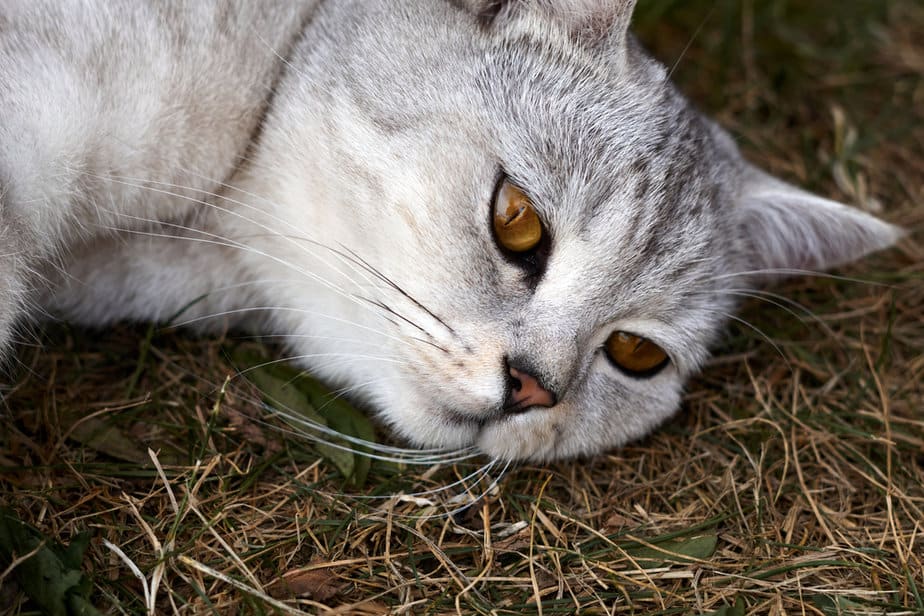
Do you think your cat’s behavior’s completely random? Think again, because we’ve gathered a bunch of rational explanations as to why she’s acting the way she’s acting. That’s not to say that you’re suddenly going to stop feeling frustrated when she decides to knock over your grandma’s vase, but…
There’s something comforting about knowing that your boisterous beast doesn’t seem to be the only cat that’s a hands-down weirdo with far-out communication methods.
Trust me, cats have an array of quirks and oddities that can send you into an endless cycle of questioning everything you thought you knew about them.
Does your furry friend do the “elevator butt” thing, for example? You might think she’s presenting you with her rear end because she’s trying to meow “talk to the butt, you peasant”, but she’s not. More times than not, she’s asking for scratches or saying that your scratches are hitting the right spot.
Or what about the “sneering” thing? Does your fluff find the most random time of the day (or night) to stare at what seems to be nothing?
There’s pretty much nobody that could scare you as much as she scares you when she does that – she’s seeing ghosts, right?! Wrong, she’s sniffing and picking up pheromones from another cat.
And, don’t even get me started on the “kneading” thing! On the off chance that your feline friend doesn’t do that, you must’ve seen the endless number of TikToks of humans showing their cats “kneading the dough” or “making a loaf of bread.” They’re doing that because of the remanence of nursing their moms.
We can learn to tolerate their quirky kitty antics, but we can’t help but wonder… “Why do cats shake their head when they eat?!” We’ve done the research and here’s what we’ve gathered!
Why do cats shake their heads when they eat?
Before we say anything else, we have to stress the fact that your cat shaking her head while she’s eating doesn’t necessarily mean something’s wrong. Cats shake their heads for an array of reasons. While some of them might be a cause for a vet visit, most of them are simply her weird way of communication.
And, on the off chance that your cat’s weirder than others – you might want to remove that little bell off of her collar while she’s eating. Other than that, consult with your vet (always a great idea) and take a look at some of the reasons why she might be shaking her head while she’s eating.
1. Hypoglycemia
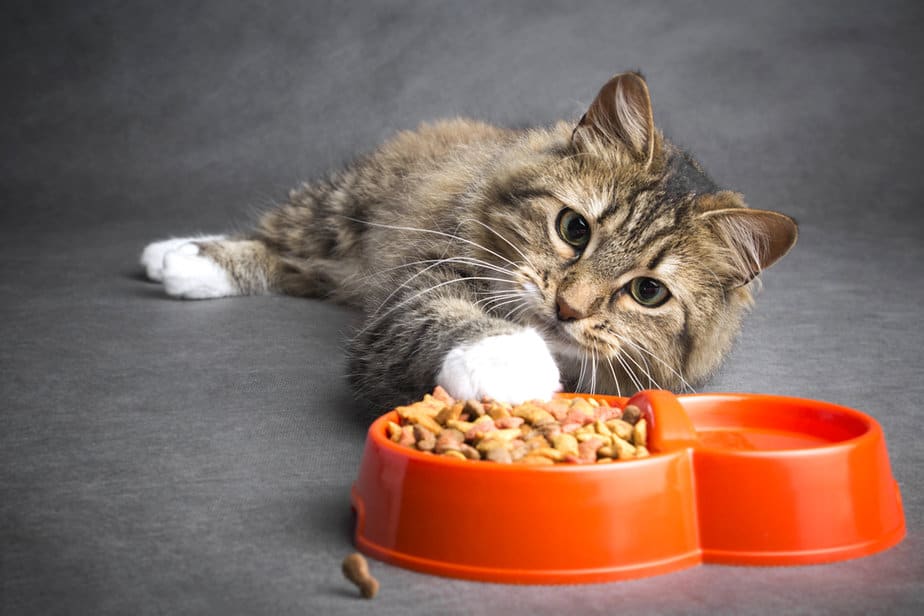
“Why do cats shake their heads when they eat? My cat keeps shaking and trembling whenever she’s trying to munch on her Meow Mix or drink some water – it’s actually distracting her from doing these things!” Did you think of your curious creature while you were reading the example? You might need to see your vet!
Hypoglycemia might not be the No.1 reason why our fluffy friends are shaking their heads while they’re eating. But, that’s not to say that you shouldn’t keep the condition in your mind when you notice your cat shaking, trembling, or even wobbling.
As a matter of fact, some of the most common symptoms of hypoglycemia are shaking, shivering, restlessness, loss of coordination, loss of consciousness, and even a coma. This is actually a condition that’s known as “low blood sugar”, which can become pretty dangerous when left untreated.
So, contact your vet the moment that you notice any of these symptoms along with the head shaking during the eating portion of your fluff’s day.
2. The “wobbly cat syndrome”
Sounds pretty cute, but couldn’t be further from that. Cerebellar Hypoplasia, also known as the “wobbly cat syndrome” seems to be one of those conditions you notice while your cat’s a kitten.
Sudden movements, loss of coordination, and loss of balance are only some of the symptoms you might notice early on. As a matter of fact, Cerebral Hypoplasia is a neurological disorder that appears when your kitten’s brain doesn’t develop properly.
While there are numerous reasons why that might happen, there aren’t that many treatment options. Unfortunately, Cerebral Hypoplasia doesn’t really have a cure.
As terrifying or saddening as that might sound, most cats that have wobbly cat syndrome live a happy and healthy life – they simply look odd while going on about their day.
Cerebral Hypoplasia doesn’t occur among the older feline population (kittens are typically born with the condition). And, on the off chance that you notice your (older) cat shaking her head when she eats, you don’t have to rush her to the emergency animal center. She’s probably doing that for a different reason.
3. Ear problems
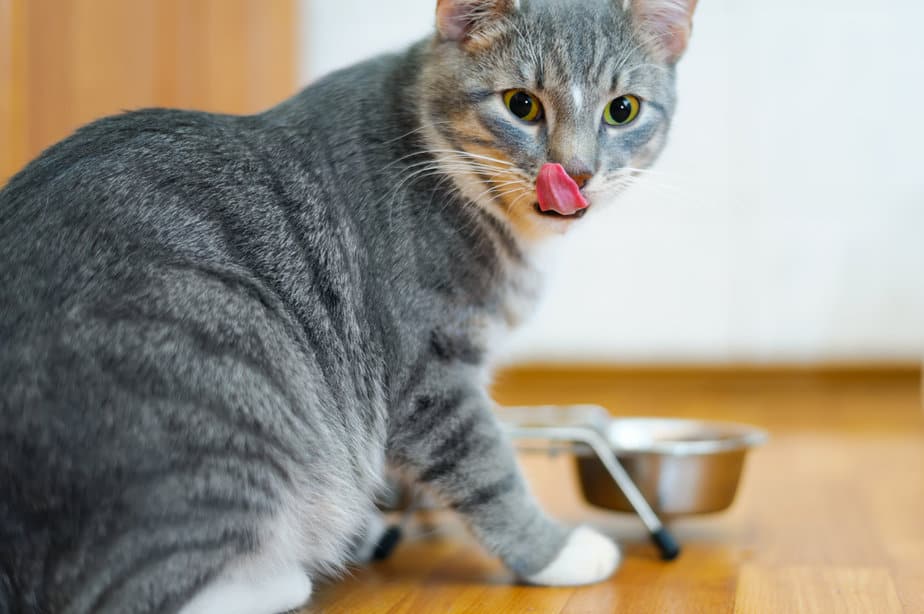
And one of those reasons could be as simple as – ear problems. Cats that battle with a weaker immune system or allergies tend to get frequent ear problems. Yellowish discharge, tilting of the head, hearing loss, redness, and swelling – yep, that’s a classic case of an ear infection.
Goes without saying that your furry friend should show at least a couple of these symptoms for you to freak out and visit your vet. Shaking during feeding time can mean a million things. But, when it’s accompanied by some of the above-mentioned problems it typically signifies an ear infection.
That’s not to say that you shouldn’t do anything regarding the problem. An untreated ear infection can cause a bunch of other health problems.
These can include partial or complete paralysis of your cat’s facial muscles. That’s a scary thing to even think about which can only mean one thing. Keep an eye on your fluff AT ALL TIMES.
4. Teeth problems
“Why do cats shake their heads when they eat? My cat can’t finish a bowl of Meow Mix without making a bunch of odd-looking grimaces, shaking her head like she’s experiencing severe discomfort, and pawing at her mouth! What does that mean?” Contact your vet ASAP because she might have teeth problems.
That’s right, cats can have rotten teeth and other teeth-related problems. You shouldn’t go too long without checking her teeth – throwing a glance around her mouth. Check for cavities and other signs of decay. You can simply touch her teeth with your fingers to make sure she doesn’t feel uncomfortable.
Some of the most common symptoms of teeth problems and dental diseases are bad breath, reduced appetite, difficulty eating, pawing at the mouth, shaking of the head, drooling, and bleeding gums. And, some of the most common dental diseases are gingivitis, periodontitis, and tooth resorption.
Schedule a visit with your vet – that’s always a great way to go. Other than that, keep your vet up-to-date on the whole “head shaking while eating” thing. While dental diseases seem like a good guess, there might be something else causing such weird behavior.
5. Mites, fleas, and other crawling creatures
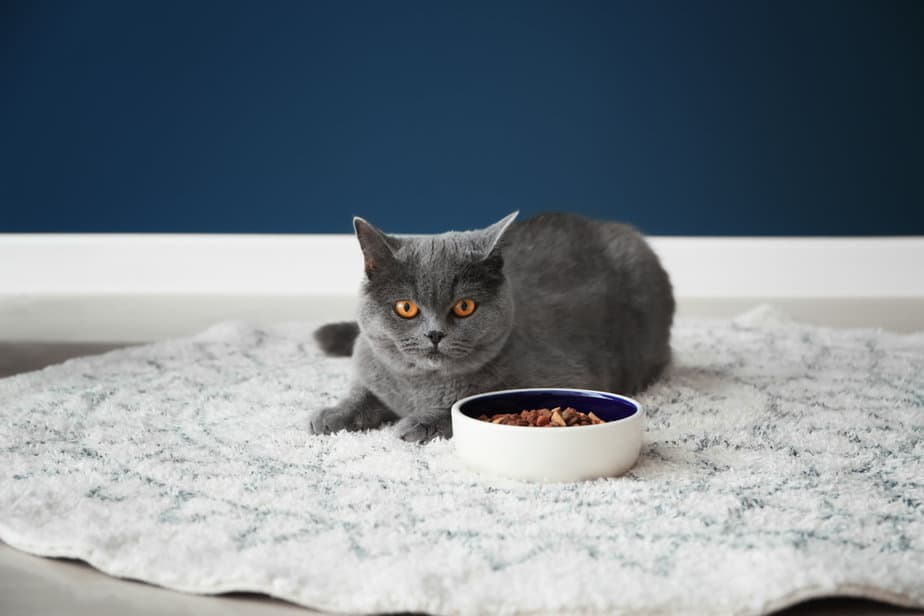
“She’s clearly shaking her head because she’s trying to get rid of something, right!?” That’s always a pawsibility – especially when she spends a lot of time outside. Mites, fleas, and other crawling creatures can easily enter your cat’s fur and cause a bunch of problems.
How can you know for sure? Check her ears for mites – these little parasites are visible when you give your cat’s ears a thorough check-up. They cause your cat to scratch her ears and shake her head hoping to get rid of them. They’re pretty harmless, but they can affect the quality of your cat’s life.
And, don’t forget to check your cat’s fluff for fleas. Fleas aren’t always visible to the human eye. But, they’re pretty easy to pinpoint when your cat starts scratching, pawing, and shaking like a weirdo. Fleas can (also) be pretty uncomfortable to deal with, and you shouldn’t shy away from contacting your vet.
Worry not, pretty much every crawling creature on the face of the planet can cause your cat to shake her head while eating. As a matter of fact, they’re pretty easy to deal with. You can go back to having fancy feasts with your fluffy friend before you can utter “Fleas!”
6. Predatory gut feeling
“Have you ever seen those Animal Planet documentaries? That’s exactly what my cat does when she’s eating! Should I be worried?!” You answered your own question there – sometimes the odd behaviors your cat’s showing are her predatory instincts coming out to play.
You might think “Oh, she’s playing with her food! She’s shaking her head while she’s eating – the foods flying everywhere!”, right? But, she’s actually swinging her head back and forth for a reason.
Back when cats were running outside and catching prey, they were employing different tactics to make sure their escapades were successful. They were shaking their heads because they were trying to stun their prey and break their neck (not their own neck, their prey’s neck).
Now, that might not make that much sense while your fluffy friend’s munching on Meow Mix. But, trust her gut feeling – maybe the Meow Mix’s planning on escaping!
7. Difficulty eating and choking on dry kibble
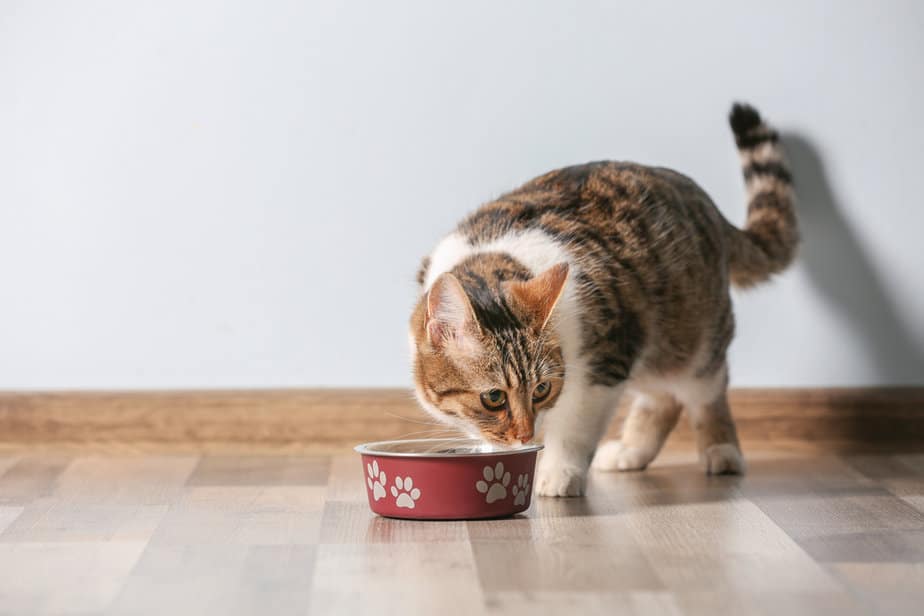
That’s right, your little munchkin would munch on pretty much anything. But, that’s not to say that she never has a problem with the food you serve her. Wet food’s pretty fine for the most part – goes down the throat easily and without much fuss (and comes out the other end sooner than you might expect).
But, dry food doesn’t seem to be as forgiving. Kibble can be pretty hard to chew – come on, that stuff’s dry as a desert.
You’re not even surprised your cat can nibble on kibble without gulping a gallon of water after each bite. You’re not even surprised she needs to shake her head to get the kibble to move out of her esophagus.
And, choking on dry food doesn’t sound that bad when you remember the alternatives (Cerebellar Hypoplasia?!). You’re pretty happy with the suggestion that your cat’s shaking her head because she’s kind of choking on a kibble bite.
But, didn’t forget to keep an eye on her and offer her help when you notice she’s struggling.
8. Communicating
Last but not least, your four-legged friend might be shaking her head because she’s trying to communicate with you.
“Why do cats shake their heads when they eat?!” Well, they wouldn’t need to shake their heads on the off chance that you would learn to say something other than a “meow” when they try to communicate.
Cats don’t have a lot of options when they’re trying to tell us how they’re feeling or what they’re looking for. They’re pretty much bound to shake and move a part of their body and hope for the best. Your feline friend might be saying something along the lines of “Wow, that’s hot!” or “I can’t eat that, I’m vegan!”
Don’t look at me, you know your cat better than anyone else. Observe her behavior and try to guess what she’s saying – granted that she doesn’t have any symptoms of anything we’ve mentioned beforehand.
